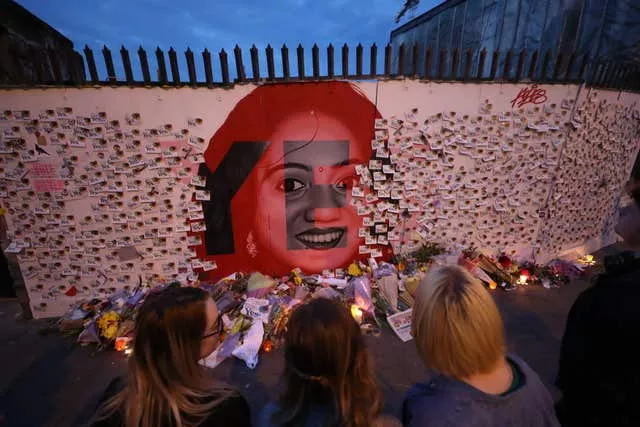The State’s abortion laws need to be reformed to ensure they are not “restrictive and punitive” as they are at present, campaigners have said.
It comes ahead of a march to commemorate the 10th anniversary of the death of Savita Halappanavar.
The 31-year-old Indian dentist died in a Galway hospital after she was refused a termination while miscarrying in 2012.
Savita’s death marked a turning point and ignited a huge movement for abortion rights. We are marching again on the 29th October to mark the 10th anniversary of Savita’s death. Ruth Coppinger @RosaSocFem opening the press conference . #NeverAgain pic.twitter.com/2rkxYysh52
— Womenscouncilireland (@NWCI) October 18, 2022
Advertisement
The march, which is being organised by a number of organisations, will take place on Saturday, October 29th, from the Garden of Remembrance to Leinster House in Dublin.
Campaigners at a press conference organised by socialist feminist group Rosa in Dublin on Tuesday said Ms Halappanavar’s death had marked a “turning point” in Irish social change.
Former TD and Rosa member Ruth Coppinger said: “The personal tragedy for Savita’s family turned into public outrage. That outrage led and ignited a huge movement in this country for repeal and for abortion rights.

“I think that the march is very important, because we appeal to people to remember Savita and say never again should any woman die or suffer who has asked for an abortion.
“Never again should people have to travel either for health care as they currently do, and never again showed religious views be allowed to take precedence over human rights in this country, in health and education and other spheres of life.”
Pro-choice activist Ailbhe Smyth said it was “very important” that Savita’s memory is honoured as her death led to an “extraordinary and very emotional outpouring” that led to thousands of people taking to the streets in protest.
“We are continuing to fight today to try to ensure that our legislation is not restricted, that it is not punitive, as it is [at] present, and that we do have services on a national, nationwide, countrywide basis to ensure that all those who need an abortion can actually access one as they are entitled to under the law,” Ms Smyth said.
From today’s press conference #Savita10Years #MarchGoesOn #SavitaMarch pic.twitter.com/DO57f3QhIJ
— ROSA - Socialist Feminist Movement (@RosaSocFem) October 18, 2022
“I think that without the provision of adequate services, it’s probably fair to say that, you know, a law is not worth the paper it’s drafted on if there is no follow up and no provision that enables people to activate their legal entitlements.”
She warned that there is “no room for complacency”.
“We have seen the extent to which abortion is under attack on a global basis,” she said.
“The most striking example of course, is the US with the reversal of Roe vs Wade, but let’s remember that here in Europe, abortion is still completely prohibited in Malta, in Liechtenstein in Andorra.
“You may say these are small places, but they’re not small if you’re a woman there who needs an abortion, and they are a blot on the European Union copybook. They are a very serious problem. And it should not be allowed to happen in 2022 that we have these absolute bans.”
The Republic’s abortion laws were changed following a referendum in 2018.
“Savita holds a special place in the hearts of Irish people. Her needless death was a turning point in Irish social change”- launching the #marchforSavita #savita10yearson #themarchgoeson @RosaSocFem pic.twitter.com/y03I3ZBW1u
— Ruth Coppinger (@RuthCoppingerSP) October 18, 2022
A medical abortion is available up to 12 weeks, but abortions thereafter are only allowed if there is a serious threat to the life or health of the mother or where two clinicians agree there is a fatal foetal abnormality.
National Women’s Council of Ireland director Orla O’Connor said the march was taking place at a “critical time” as a review of the current legislation is under way.
“There is so much unfinished business with regard to abortion provision – too many women or pregnant people who need an abortion still can’t get one,” Ms O’Connor said.
She criticised part of the legislation which means doctors can be prosecuted for providing a termination in certain circumstances.
“There are many issues in terms of the review that need to be addressed,” Ms O’Connor said.
“For example, in the case of fatal-foetal anomaly, we know that many women are being forced to travel under the existing legislation as it’s too restrictive.

“The 12-week gestational limit is also too rigid and also the ongoing criminalisation of abortion in Ireland is a significant barrier for access in relation to the medical profession, and one which must be addressed in the three-year review.”
She told those gathered that a survey by the council earlier this year had found that some 70% of people believed abortion should be treated like any other medical procedure and should not be a matter for criminal law.
Former master of the National Maternity Hospital Dr Peter Boylan also criticised the current law.
“It’s the only area of medicine where a doctor can be criminally prosecuted as things stand in law at the moment,” he added.
“No other area of medicine, not cardiology, orthopaedic, psychiatry, so an obstetrician dealing with a couple is open to a criminal prosecution if they make a mistake, and that’s that’s not the way you should practice medicine in a modern democracy.”
While he said there has been an improvement with the introduction of the legislation he said the experience of the last few years speaks to the “need for change”.







